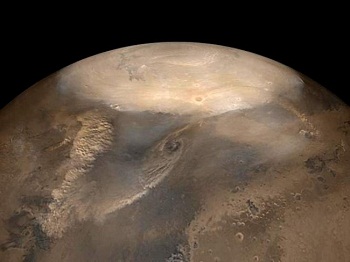Nearly every atmospheric science textbook ever written will say that hurricanes are an inherently wet phenomenon — they use warm, moist air for fuel. But according to new simulations, the storms can also form in very cold, dry climates, according to Science Daily.
A climate as cold and dry as the one in the study is unlikely to ever become the norm on Earth, especially as climate change is making the world warmer and wetter. But the findings could have implications for storms on other planets and for the intrinsic properties of hurricanes that most scientists and educators currently believe to be true.
“We have theories for how hurricanes work at temperatures that we’re used to experiencing on Earth, and theoretically, they should still apply if we move to a colder and drier climate,” said Dan Chavas, an assistant professor of earth, atmospheric and planetary sciences at Purdue University. “We wanted to know if hurricanes really need water. And we’ve shown that they don’t — but in a very different world.”
In the world we live in now, hurricanes need water. When they reach land, they die because they run of out the water they evaporate for energy — but that doesn’t have to be the case.
“Just because there isn’t something changing phase between liquid and vapor doesn’t mean a hurricane can’t form,” Chavas said.
In collaboration with Timothy Cronin, an assistant professor of atmospheric science, he used a computer model that mimics a very basic atmosphere and constantly generates hurricanes. In a general hurricane scenario, this looks like a box with ocean at the bottom, but Chavas tweaked it to dry out the surface or cool it below temperatures that usually generate hurricanes.
The coldest simulations were run at 240 degrees Kelvin (-28 F) and produced a shocking number of cyclones. These cold, dry storms were generally smaller and weaker than the hurricanes on Earth, but they formed at a higher frequency.
As the temperature drops, the air can hold less water, which explains why cold temperatures and dry surfaces yield similar results in experiments. At 240 degrees K, air can hold roughly 100 times less water vapor than at temperatures typical of the modern tropics.
Interestingly, there is a range of moderate temperatures and moisture levels in which no cyclones formed at all. From 250 to 270 degrees Kelvin (-10 F to 26 F), no hurricanes formed, although the researchers aren’t sure why. At 280 Kelvin (44 F), the atmosphere filled again with cyclones.
“Maybe that means there are ideal regimes for hurricanes to exist and the current world we live in is one,” Chavas said. “Or you could be in another world where there’s no water, but it’s still capable of producing many hurricanes. When people are considering whether we could live on a dry, rocky planet like Mars, this could be something to consider.”
Such a planet could have even more hurricanes than occur on Earth. Because it’s difficult to study the atmospheres of other planets, scientists have to work with their knowledge of Earth and fundamental understanding of how atmospheres function.
N.H.Kh

